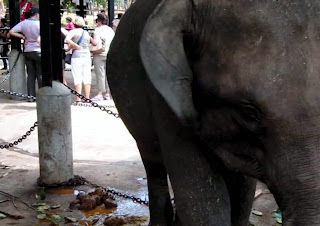Plenty of room - it's overtake time!
They whisked us off to the Ramada Katanayake where we had elected to try and sleep, wash and grab some breakfast before hooning off up-country to Kandy. The hotel was okay, barely - fine for the stopover. The master plan was to visit a spice garden and the Elephant Orphanage at Pinnawala on the way up and we duly did this. Of our encounter with spice, more later.
It's hard to get used to driving in Sri Lanka, although Duminda was as safe a pair of hands behind the wheel as I've ever seen. TukTuks and motorbikes are all over the place, trickling through the choking traffic like sand through marbles. It's all breakneck stuff, coaches appear out of nowhere heading straight at you as they overtake a pair of parallel TukTuks and a moped before melting out of the way miraculously at the last minute just as you'd started to see your life flash in front of your eyes and only got as far as the first time you put your hands up a girl's jumper. The road to Kandy is a twisty turny thing, constantly choked with sluggish lorries and peripatetic coaches given to sudden stops sans indicators. We're overtaking half the time, crouching poised on the bumper of the lorry in front the rest of the time. It's not for the faint-hearted, this stuff.
The Elephant Orphanage at Pinnawala was a fascinating experience, but one we won't be repeating thank you very much. In reality, this is no more an orphanage than a kitten tied to a stick and pelted with stones is an orphanage.
Foreigners pay 2,500 rupees to get into this exhibit and Sri Lankans 100. Neither gets any explanation of the work of the orphanage, the need for such work or how the orphanage is investing our 2,500 rupees (the price of a fine dinner for two in a hotel) into bettering the lives of the elephants in its care. In fact there's little to no information on hand anywhere, just bunches of elephants.
As you walk around, you start to realise why - there is no focus on education or familiarisation at all - and no evidence of any focus on animal welfare whatsoever. This is spectacle, not conservation at work. It's actually mildly revolting. The animals are chained, some exhibiting clear locked-in syndrome behaviour. The 'mahouts' control the animals using barbed pikes. You can feed a (unhealthily fat-looking) elephant a bowl of fruit for a fee and have your photo taken. You can watch others eating leaves as they wander about in puddles of their own faeces in concrete pens.
Chains and shit. Something of a theme at Pinnawala...
Tourists feed baskets of fruit to an unhealthily fat-looking elephant.
The 'mahouts' rake in the cash...
There's no clear signage. There's a shop you have to exit through. Crossing the road, you can watch the elephants bathing. This daily spectacle is best viewed from two restaurants with balconies overlooking the river. The elephants enjoy the water. Two of the elephants are encouraged - in front of the more expensive hotel balcony - to immerse themselves. This is achieved with pokes and scratches from the mahout's pike.
It's all heart-warming stuff: the exploitation of animals for tourists gawping from perches in concession-paying outlets reached through an alleyway of tourist-trap hucksters pushing 'elephant poo paper' and various other gaudy knick knacks.
Government-run, you do wonder if this is not some strange microcosm of Sri Lankan governance, but this is the route to acute depression, so it's time to move on and swear never to return...




